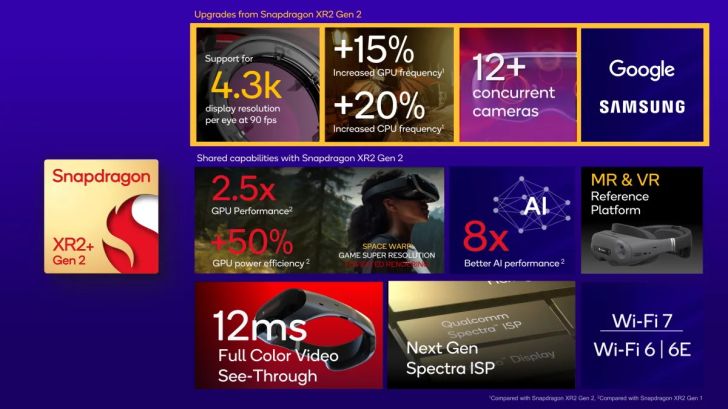This Qualcomm SoC Will Power Samsung & Google’s Vision Pro Competition،
In 2023, Apple took a leap forward in terms of innovation when the brand announced its first mixed reality headset, Apple Vision Pro. The headset is expected to start selling in February this year and is packed with new features. Now, to give a tough fight to Apple Vision Pro, leading chipmaker Qualcomm has launched its VR chipset – Snapdragon XR2+. It was designed for virtual and mixed reality headsets that will compete with Apple Vision Pro in the years to come.
Qualcomm claims that brands like Samsung and Google are planning their own mixed reality headsets and that they will use this new chipset in their devices. Previously, Microsoft and Meta devices were powered by Qualcomm's XR chipset.
The capabilities of the Snapdragon XR2+ chipset indicate what all of Google and Samsung's headsets will be able to do when they become official.
ALSO READ: Water Heater and Geyser Buying Guide: Know How to Make the Perfect Buying Decision?
ALSO READ: Xiaomi Redmi Note 13 5G series launched in India: Price starts at INR 16,999
Snapdragon XR2+ Chipset: Features
The Meta Quest 3 powered by the Snapdragon XR2 SoC comes with decent graphics, external camera support, AI capabilities, and color passthrough camera quality. The Plus variant claims to make the headsets even more premium. Besides Google and Samsung, Qualcomm has confirmed that HTC, Vive and Immersed use their new VR chipset.
The Snapdragon XR2+ will support 4K displays and better mixed reality passthrough. It will offer more simultaneous camera and tracker performance, which will include eye tracking and full body tracking depending on how brands design their devices. The XR2+ will support a resolution of up to 4.3K pixels per eye and a 90Hz refresh rate.
The quality of the pass-through camera has also reportedly been improved. Said Bakadir, senior director of product management at Qualcomm, confirmed that the SoC will support better camera resolutions and display images in greater detail on better displays. Apple Vision Pro has decent cameras and brands like Samsung will definitely want to have something equal, if not better, on their VR devices.
The XR2+ chipset will feature more sensors as it will be able to support up to 12 cameras and sensors simultaneously. The cameras can be linked to motion tracking, external video capture, depth sensing, etc., as well as eye and face tracking motion cameras.

In-controller camera sensors, full-body tracking sensors, and other sensors could also be part of these 12 cameras. Some reports claim that Samsung and Google are considering using radar-based Soli sensor technology for near-body gesture tracking.
The Snapdragon XR2+ chipset will be WiFi 7 compatible, which means that in terms of connectivity it will offer more options. Given that Qualcomm has already split rendering and is looking for ways to integrate AR glasses and smartphones to work seamlessly, such cross-device relationships could strengthen with the XR2+ SoC. The chipset is also expected to come with AI capabilities.
Just like Vision Pro can connect to Macs, Samsung and Google would also like their headsets to seamlessly connect to Android OS devices.
Although Samsung and Google have remained tight-lipped about their VR headset plans, Google's VP of augmented reality welcomed the launch of the XR2+ chipset, saying: “We are excited for the Android ecosystem to benefit from the capabilities of Snapdragon XR2 Plus Gen2 and enable new experiences.”
You can follow Smartprix on Twitter, Facebook, Instagram and Google News. Visit smartprix.com for the latest news, reviews and technical guides.
















